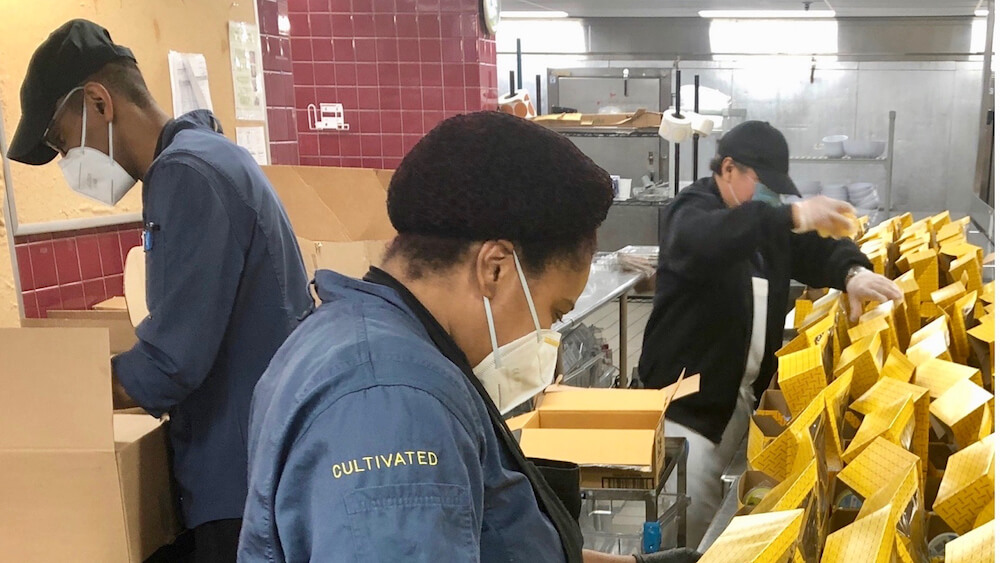
Cultivated, a hospitality brand that is a collaboration between Javits Center, Levy, and catering service CxRA, has put together up to 40,000 military meals per day during the COVID-19 crisis.
Convention centers across the country recently repurposed into temporary hospitals, shipping and receiving areas for medical supplies, and government agency headquarters during the COVID-19 crisis had the same need as when they housed conventions: They had a lot of mouths to feed. During the crisis, that need was met by food and beverage provider Levy Restaurants at four of those centers — Jacob K. Javits Convention Center in New York City, Boston Convention & Exhibition Center, Greater Columbus Convention Center, and Los Angeles Convention Center.
Providing food during a crisis is nothing new to the caterer. “We were there in Houston and Puerto Rico in 2017 to help the communities rebuild after hurricanes Harvey and Maria,” said Cindy van Rensburg, division president of Levy Convention Centers. “This is much different, but as a result of our partnerships with the venues, we have people, resources, and knowledge to help with crucial access to nutrition and water.”
Due to the swift spread of COVID-19 throughout New York, Levy’s first task was serving Javits Center starting in March, where the organization worked with the Army Corps of Engineers and local and state emergency offices to coordinate staff and patient meals. As of late May, Cultivated — a hospitality brand that is a collaboration between Javits Center, Levy, and catering service CxRA — has served 20 federal, state, and city agencies and up to 40,000 military meals per day, in addition to patients.
RELATED: COVID-19 Response: Getting Food to the People Who Need It
There were two different groups that Cultivated needed to attend to at Javits Center, according to Mariam Karim, vice president of guest experience at Javits Center. “The military meals … they were eating out of our food court that used to serve Comic Con and [the New York International] Auto Show,” Karim said. “We just had to make sure that we were able to be mindful of physical distancing and how lines queued, and then the staffing from a culinary perspective — making sure that they had plenty of space between them — and then being able to then execute the menu from there.” Military men and women were seated a safe distance apart and able to use a cashless point-of-sale system to avoid unnecessary contact with others.
The second group Cultivated served included hospital patients, which required an entirely different approach. Cultivated worked closely with Health and Human Services in preparing on-site meals and delivering the meals to a designated location. “Health and Human Services, along with the National Guard, would pick up the meals from that location and then serve patients on the floor,” Karim said, “just because we had to be mindful of the fact that our staff wasn’t necessarily prepared to actually enter the hospital floor.”
To ensure proper patient service, Levy teamed up with Morrison Healthcare and Crothall Healthcare “to develop a strategic playbook,” van Rensburg said, which addresses “nutrition for patients with different dietary needs, meals for first responders and health-care professionals, personal protective equipment protocols for our team members, and staffing and production strategies.”
RELATED: Feeding the Front Lines and Food Insecure During COVID-19
While every convention center Levy serves is different, van Rensburg noted that best practices have been universal. When team members arrive for work, they are given temperature checks and must answer screening questions to assess exposure risk, as well as encouraged to consult a manager “if they have any concerns,” van Rensburg said. While many of the centers around the country are not currently housing patients, Levy has remained to continue serving individuals working out of the facilities, in addition to staying on standby in the event of a second wave of COVID-19.
According to Karim, many of the measures Cultivated has taken to ensure the safety of both staff and clients at Javits Center will likely continue once in-person events are able to resume. “We’re working very closely with our event producers in envisioning what the new world of events will look like, at least as we perhaps roll it out in phases,” Karim said. “And then hopefully as the events industry returns back to normal, we can kind of go back to some version of what we recognize as normal.
“When this time passes, there will likely be conditions and safeguards for health and safety,” van Rensbug agreed, “but however the manner, we look forward to coming back together as a team.”
Casey Gale is an associate editor at Convene.
